Techno-pup: Watching your cats and dogs by remote control
- Published
- comments
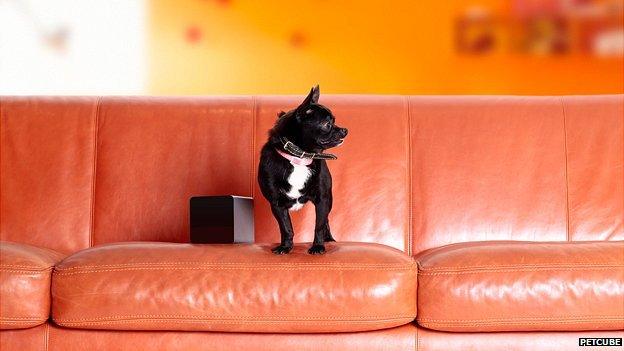
Puppy love: Rocky with his new friend, Petcube, which keeps him occupied - and the neighbours happier
The death of a pet is something you never forget.
It separates the pet owners, who understand the wrenching pain and sense of loss, from those that live a life without small, loyal, four-legged life companions.
Ben Jacobs is a pet owner.
"It is one of the things that as a dog lover, it really stays with you," he says.
Growing up he had a German Shepherd called Bear.
"Bear passed away when he was only five years old," he remembers.
"It was one of those seemingly sudden issues to our family. He seemed fairly healthy one day, and then all of a sudden Bear had an intestinal issue where his intestines were twisting and sadly we had to put him down."
Dogged determination
That experience stayed with him, leading many years later to the creation of his start-up, Whistle.
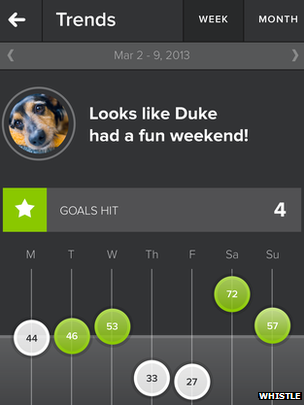
Status update: The app lets you look in on your pooch wherever you are, and see what they're doing
"Over four in 10 UK households have a dog, here over six in 10 US households have a dog or cat," says Mr Jacobs.
"They are such part of the family, and yet we don't have the information to take good care of them. So my goal was to help people with dogs like Bear try to understand their day-to-day patterns of health, and maybe some long-term trends as well."
Whistle records your dog's movements, and flags up any unusual behaviour that could indicate illness. A small activity tracker containing an accelerometer is attached to the animal's collar, and transmits the data gathered to the company's servers over wi-fi.
This is then analysed, comparing it to your dog's normal behaviour - and a database the start-up is building of typical behaviour. You can also send a full activity report to your vet.
"We can know if your dog went for a walk or played in the park, and you can see that activity in an fun timeline-like format on your mobile phone," he says.
The app means you can follow what your pet is up to when you're not around, as well as add comments and photos to the timeline to share with family members or friends.
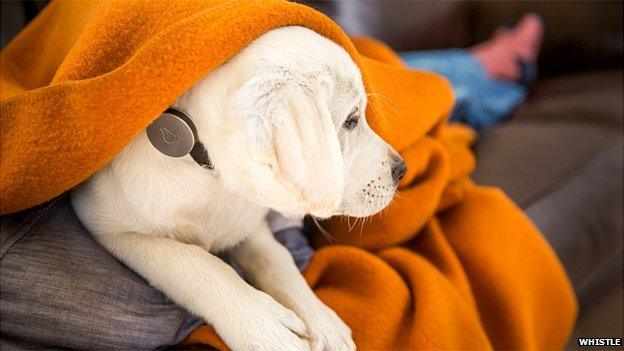
Dressing up: The Whistle collar device is being used at the University of Pennsylvania to track sick dogs at their research facility - the data gathered by the tag tells them what the dogs can't
The pet industry is worth over $50bn (£33bn) in the US alone each year, external, so it's not surprising a growing number of start-ups are targeting the market, especially when you consider the love affair between furry animals and the internet.
There is the eminently useful, like Pintofeed, external, a remote feeding system controlled using your smartphone. Or New York's Swifto, external, which lets you book dog walkers online and track your pet's walk using GPS.
There's philanthropic endeavours like iPet Companion, external - you can play with abandoned cats, external living in shelters across the US, online.
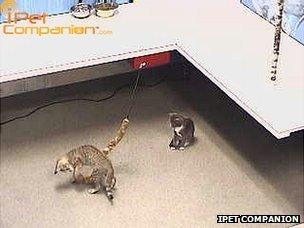
iPet Companion lets you play with cats in shelters in the US from your desktop - and take a photo
And then there's the quirk, like Snapcat, external, which lets your kitty take selfies - photos of themselves - by themselves.
A dog's life
Many have been inspired by the love their founders have for their pets.
When Alex Neskin and his girlfriend moved to a new apartment in the Ukrainian capital Kiev, their canine roommate Rocky wasn't happy.
The new surroundings didn't suit him. And as he's a very small dog, and his owners have to work, there wasn't a lot he could do about it. Mr Neskin was worried about him.
"He [decided] to hack something with an Arduino, which is like a prototyping board for geeky people. He mounted a camera, connected it to the computer," says Yaroslav Azhnyuk, Mr Neskin's friend and co-founder.
Watching what happened when Rocky was on his own made for grim viewing. He spent his days sitting in front of the door, barking. He was bored and lonely.
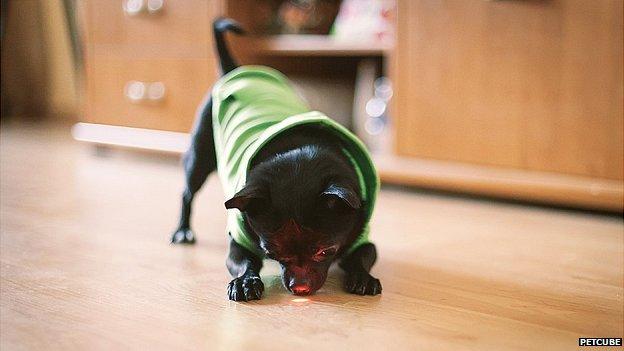
Current occupation: One of Rocky's favourite things to do is chase the light from a laser pointer
Being a programmer with an interest in robots, he decided to improve on his robot by attaching a low-light laser pointer that moved with the camera. He linked it up to a website so that he and his friends could play with Rocky from anywhere in the world.
To the relief of his neighbours, Rocky loved it.
"Everyone was saying: 'Well I want this thing for my dog or for my cat' and that's how an idea to make it a business appeared," says Mr Azhnyuk.
The two friends and their third co-founder Andrey Klen created Petcube, and started to work out how to make their idea a reality.
It launched for pre-order in May, and already 2,000 people have signed up. The plan is to launch a Kickstarter campaign in August to raise the production capital.
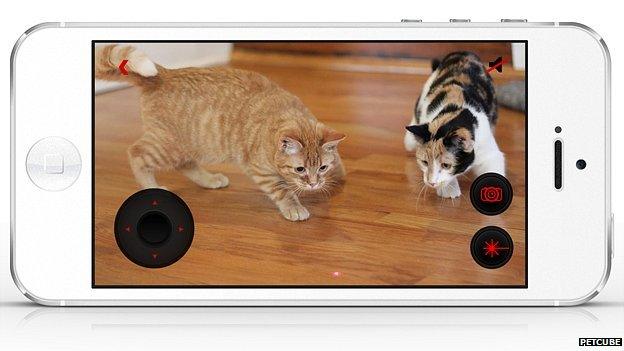
Long distance relationship: The Petcube app will let you play with your pets - and talk to them - on your smartphone from wherever you are in the world
The device can be accessed from the web or a smartphone app, and the laser has been checked by a vet to make sure it's perfectly safe.
Cubes can be made public, so anyone can play with your four-legged friend.
"You can message other people and ask them about different stuff about their pets, what they doing and so on. So the grand vision behind this is to make this kind of a social network for pet owners," says Mr Azhnyuk.
Holiday home
If keeping your pet properly occupied when you're a little farther from home is the problem - a beach in the Philippines for example - then Seattle-based Rover.com, external might be for you.
The start-up and its main competitor, DogVacay, external, let you book pet-sitters online.
The idea is that dogs are happier staying in a home rather than kennels. Rover founder Greg Gottesman had the idea for the service after his golden retriever, Ruby Tuesday, developed health problems after a kennel stay.
Prospective sitters have to go through a rigorous selection process, that now includes background screening, external.
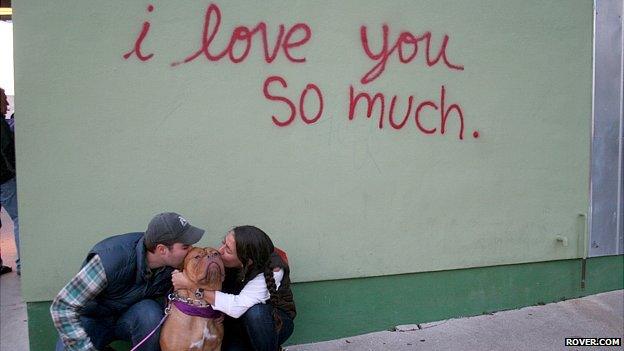
Home from home: Rover.com believes that dogs are happier being looked after in a home environment when their owners are away - these Rover owners from Austin, Texas, agree
"To qualify as a Rover.com sitter, an applicant must have experience with dogs and obviously love them," says the company's Susan Koehler.
"We require that each sitter demonstrate a care plan for Rover dogs, and we look for and highlight advanced skills and affiliations such as medical/vet training, CPR certification and associations with Humane Societies, Pet Rescues and other charitable organisations."
Sitters also have to provide a reference from a reputable third party.
While on holiday owners receive daily photos and updates on their pets, so they know they're being taken care of.
"It's a lot less stressful on the pups because they are in a real home, so it's easier to keep a dog on their general routine for walks, playtime, eating, cuddling on the couch and even sleeping in a bed with the sitter," she says.
Littlest hobo
Next to critical illness, one of the most worrying moments in a pet owner's life is when their small friend decides to go walkabout - alone.
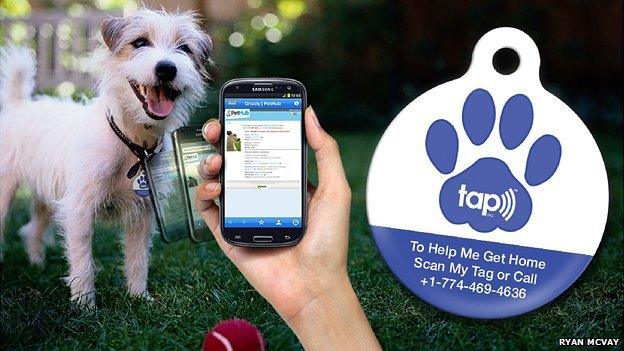
Tag team: The Pethub tag has a QR code (Quick Response code - or 2D barcode) linked to your pets profile
Pethub started in the US, and now operates in 22 countries. It produces collar tags that have a QR code, website address, phone number and more recently an NFC (near field communication) chip that connects people that find stray pets with their owners.
By reading the QR code or the NFC chip with a smartphone, a profile for the lost animal is brought up, with a list of emergency contacts. An alert is sent either to you or to Pethub to say that the tag has been scanned, as well as an email with GPS coordinates so you can track Spot down.
"It can help the pet get home before they even get to the shelter to be scanned from microchip," says Pethub's Lorien Clemens.
"In the United States only 5% of pets have microchips and about 58% of those are out of date."
Pethub can also sends details of lost pets to local shelters and vets.
As well as dogs and cats, Pethub has horses, goats and even two "escape artist" tortoises as customers.
"Last year we looked at all of our pet recoveries, and we found that 97% of them had gone home on the same day that they were missing, and 25% have gone home within an hour after going missing," says Ms Clemens.
Now, if technology could just find a way to get the dog to wash himself...
- Published10 May 2013